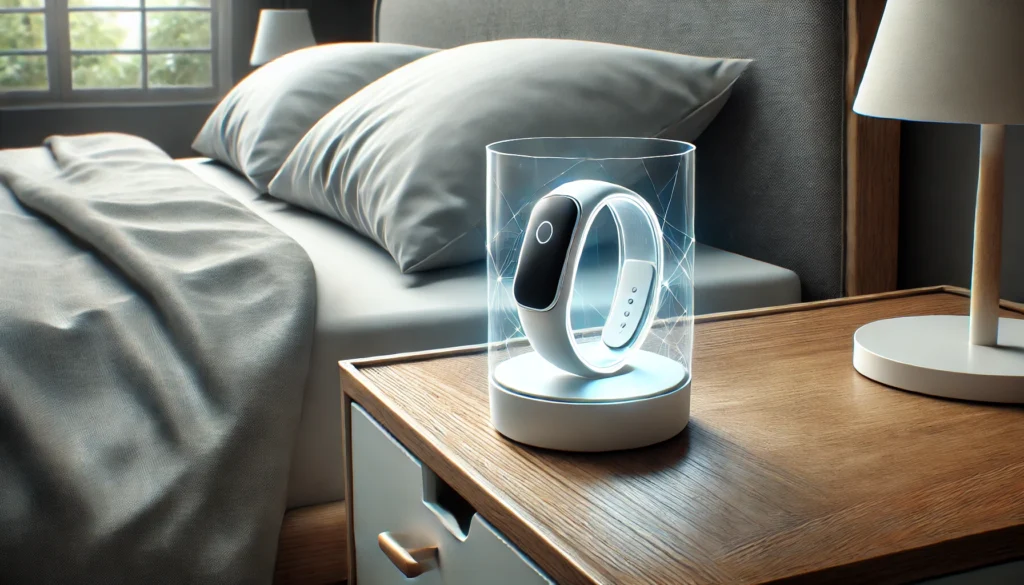In the ever-evolving landscape of health technology, the Fitbit sleep tracker stands out as a revolutionary tool that has transformed the way we monitor and understand sleep patterns. With its blend of cutting-edge technology and user-friendly design, Fitbit has made sleep tracking accessible to millions, offering insights that were once confined to clinical settings. As sleep health becomes an increasingly important component of overall wellness, Fitbit’s innovations have paved the way for a deeper understanding of how sleep impacts our daily lives.
You May Also Like: Ultimate Guide to Sleep Tracker Apps
The Genesis of Sleep Tracking Technology
The concept of monitoring sleep is not new. For decades, sleep studies were conducted in controlled environments, with patients connected to a variety of sensors to measure brain activity, eye movement, heart rate, and more. These studies, though comprehensive, were often cumbersome and expensive, accessible only to those with specific medical needs or research interests. The evolution of sleep tracking technology has made it possible for anyone to gain insights into their sleep patterns from the comfort of their own home.
The Limitations of Traditional Sleep Studies
Traditional sleep studies, conducted in sleep labs, involve extensive setup and monitoring. Patients often find it difficult to sleep normally under such conditions due to the unfamiliar environment and the physical presence of electrodes and wires. While these studies provide valuable data, they are limited by their artificial setting, which may not accurately reflect an individual’s natural sleep patterns.
The Rise of Wearable Technology
With advancements in technology, sleep monitoring began to make its way into consumer markets. Early devices were rudimentary, tracking only basic metrics such as movement during sleep. However, as technology advanced, so too did the capabilities of these devices. Fitbit emerged as a leader in this space, leveraging its expertise in wearable technology to create a device that was not only accurate but also user-friendly. This shift marked the beginning of a new era where sleep tracking became a part of everyday health monitoring.
Bridging the Gap Between Clinical and Personal Use
The transition from clinical sleep studies to personal sleep tracking devices marked a significant shift in how we understand and manage sleep health. By providing access to detailed sleep data, Fitbit and similar devices have empowered individuals to take an active role in their sleep health. This democratization of sleep data has made it possible for people to identify potential sleep issues and seek timely interventions.

How Fitbit Changed the Sleep Tracking Game
Fitbit’s entry into the sleep tracking market marked a significant shift. By making detailed sleep analysis available to the general public, Fitbit democratized access to health data that was once reserved for clinical settings. This move has had profound implications for both individual users and the broader healthcare industry.
The Science Behind Fitbit Sleep Tracking
Fitbit sleep trackers utilize a combination of accelerometer data and heart rate monitoring to provide a comprehensive view of sleep patterns. The device can distinguish between different stages of sleep—light, deep, and REM—offering users insights into not only the quantity but also the quality of their sleep. This scientific approach ensures that users receive accurate and actionable data about their sleep health.
Light Sleep: The Gateway to Restorative Sleep
Light sleep acts as a transition between wakefulness and deeper sleep stages. During this phase, the body starts to relax, and heart rate begins to slow down. Although light sleep is not the most restorative, it plays a crucial role in transitioning to deeper, more restorative stages. Understanding the duration and timing of light sleep can help users optimize their sleep schedule for maximum restfulness.
Deep Sleep: The Foundation of Physical Recovery
This stage is critical for physical recovery and growth. It is during deep sleep that the body repairs tissues, builds muscle, and strengthens the immune system. Fitbit’s ability to track this stage provides users with valuable insights into their physical health and recovery. Monitoring deep sleep can help individuals identify factors that may disrupt their recovery process, allowing them to make informed lifestyle adjustments.
REM Sleep: The Key to Cognitive Well-Being
REM sleep is essential for cognitive functions, including memory consolidation and mood regulation. By tracking REM sleep, Fitbit helps users understand their mental health and cognitive performance. Disruptions in REM sleep can lead to cognitive impairments and mood disturbances, making it a critical area of focus for those looking to improve their mental well-being.
User-Friendly Design and Accessibility
Fitbit has always prioritized user experience in its design philosophy. The sleep tracker is no exception. With a sleek design and intuitive interface, users can easily navigate their sleep data, gaining insights without feeling overwhelmed by technical jargon. This accessibility ensures that users of all ages and technical abilities can benefit from the insights provided by their Fitbit device.

Current Trends and Future Implications
The Fitbit sleep tracker has set a precedent in the world of wearable technology, inspiring a wave of innovation and competition. As we look to the future, several trends and implications emerge, highlighting the potential for continued advancements in sleep health monitoring.
Integration with Digital Health Ecosystems
Fitbit’s sleep data is increasingly being integrated into broader digital health ecosystems. This integration allows users to combine sleep data with other health metrics, such as physical activity and nutrition, creating a holistic view of their health. By understanding how sleep interacts with other aspects of health, users can make more informed decisions about their lifestyle and wellness.
Personalization and Precision Medicine
The detailed data provided by Fitbit sleep trackers has the potential to contribute to the field of precision medicine. By understanding individual sleep patterns, healthcare providers can offer personalized recommendations and interventions, improving overall health outcomes. This personalized approach to healthcare has the potential to revolutionize the way we manage and treat sleep disorders.
The Role of AI and Machine Learning
As technology continues to evolve, the incorporation of AI and machine learning into sleep tracking devices is becoming more prevalent. These technologies can analyze vast amounts of sleep data to identify patterns and predict potential sleep issues before they arise. This proactive approach to sleep health has the potential to significantly improve individual outcomes and reduce the burden on healthcare systems.
Privacy and Data Security Concerns
As with any technology that collects personal data, privacy and security remain top concerns. Fitbit has implemented robust measures to protect user data, but as technology evolves, ongoing vigilance will be necessary to safeguard personal information. Users must remain informed about how their data is being used and take steps to protect their privacy.
Practical Advice for Optimal Sleep
While technology provides valuable insights, it is important to remember that it is just one piece of the puzzle. For those seeking to optimize their sleep, here are some practical tips that can complement the data provided by sleep tracking devices.
Create a Consistent Sleep Routine
Establishing a regular sleep schedule can help regulate your body’s internal clock, making it easier to fall asleep and wake up naturally. Consistency is key, so try to maintain the same sleep and wake times, even on weekends. This regularity can improve overall sleep quality and help you feel more rested.
Optimize Your Sleep Environment
Ensure your sleep environment is conducive to rest. This includes a comfortable mattress, adequate room temperature, and minimizing light and noise. Consider blackout curtains, white noise machines, or earplugs to create a more serene sleeping environment. Personalizing your sleep space can have a significant impact on the quality of your sleep.
Mind Your Diet and Exercise
Avoid heavy meals, caffeine, and alcohol close to bedtime. Regular physical activity can also promote better sleep, but try to avoid vigorous exercise close to bedtime. Instead, opt for relaxing activities like yoga or stretching to wind down before bed. A balanced lifestyle that includes a healthy diet and regular exercise can improve sleep quality and overall health.
Manage Stress and Relaxation Techniques
Stress is a common disruptor of sleep. Incorporate relaxation techniques such as meditation, deep breathing exercises, or progressive muscle relaxation into your nightly routine. These practices can help calm the mind and prepare the body for rest, leading to more restorative sleep.

Conclusion: The Ongoing Evolution of Sleep Monitoring
The Fitbit sleep tracker has revolutionized the way we approach sleep health, making detailed analysis and insights accessible to the average consumer. By bridging the gap between clinical research and personal health, Fitbit has empowered individuals to take control of their sleep and, by extension, their overall health and wellness. As technology continues to advance, we can expect even more sophisticated tools and insights that will further enhance our understanding of sleep.
For now, the Fitbit sleep tracker remains a pivotal tool in the quest for optimal health and wellness, providing a glimpse into the future of personalized health monitoring. As we continue to explore the complexities of sleep, the insights gained from devices like Fitbit will be invaluable in shaping a healthier future for all.
Further Reading:
Fitbit app gets Material You redesign for Sleep data
Fitbit Owners Advised To Have Their Say On Revamped Feature
Fitbit’s redesigned its Sleep page to make it more useful: here’s what’s changing
Important Note: The information contained in this article is for general informational purposes only, and should not be construed as health or medical advice, nor is it intended to diagnose, prevent, treat, or cure any disease or health condition. Before embarking on any diet, fitness regimen, or program of nutritional supplementation, it is advisable to consult your healthcare professional in order to determine its safety and probable efficacy in terms of your individual state of health.
Regarding Nutritional Supplements Or Other Non-Prescription Health Products: If any nutritional supplements or other non-prescription health products are mentioned in the foregoing article, any claims or statements made about them have not been evaluated by the U.S. Food and Drug Administration, and such nutritional supplements or other health products are not intended to diagnose, treat, cure, or prevent any disease.


